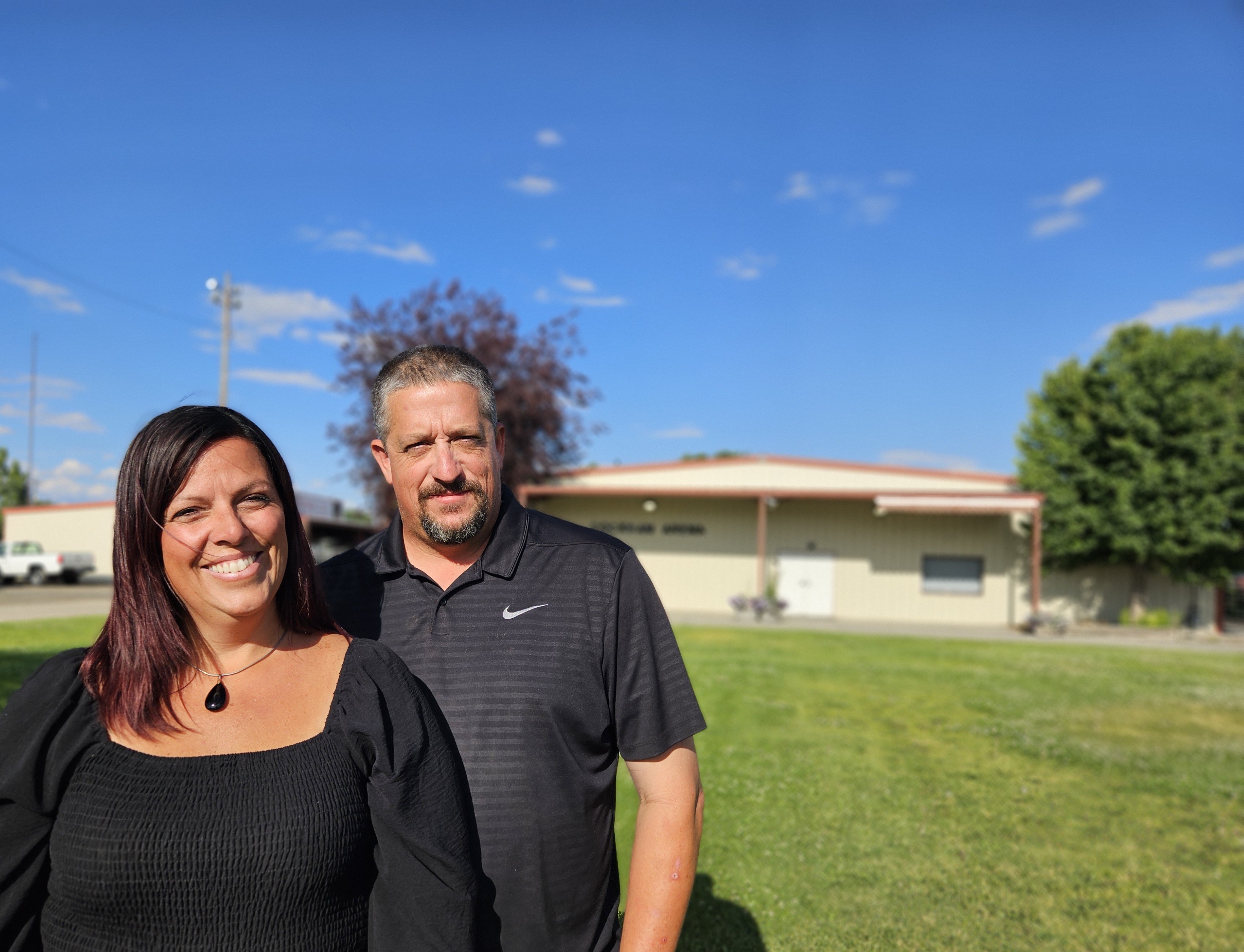Police chief wants limits on homeless camping
Published 2:15 pm Wednesday, November 17, 2021

- Gordon Holman, who owns and is renoving the former Baker House building on Fifth Street between Madison and Baker streets, has asked local officials to do something about the items on the sidewalk in front of his building.
Baker City Police Chief Ty Duby plans to ask the City Council to approve an ordinance limiting where, and when, people can camp on public property within the city limits.
Trending
Duby said he was prompted to act by a bill that the Oregon Legislature passed earlier this year and that Oregon Gov. Kate Brown signed into law on June 23.
The law — introduced as House Bill 3115 and passed by the Democratic majorities in both the state House and Senate — is based on a 2019 federal court ruling in a Boise case that in effect prohibited cities and counties from making it illegal for people to sleep outdoors in public spaces if the jurisdiction doesn’t provide indoor alternatives.
Baker County’s two state legislators, Sen. Lynn Findley, R-Vale, and Rep. Mark Owens, R-Crane, both voted against the bill.
Trending
The new Oregon law states that cities or counties which have ordinances that regulate “the acts of sitting, lying, sleeping or keeping warm and dry outdoors on public property that is open to the public must be objectively reasonable as to time, place and manner with regards to persons experiencing homelessness.”
The law also states that “A person experiencing homelessness may bring suit for injunctive or declaratory relief to challenge the objective reasonableness of a city or county law.”
The law states that “reasonableness shall be determined based on the totality of the circumstances, including, but not limited to, the impact of the law on persons experiencing homelessness.”
Baker City has no such ordinance, Duby said.
Nor does the city have an indoor facility for homeless people to stay. That means they can legally camp on public property with no limitations.
However, Duby said he doesn’t believe anyone, including homeless people, has a legal right to keep their possessions indefinitely on public property or to block people from using sidewalks, streets or other public rights-of-way.
“The way I look at it, you have the right to sleep (on public property), but that doesn’t mean you can collect all this stuff and have it strewn about on public property and sidewalks,” Duby said. “It’s not fair to the neighbors, and it’s not fair to the city.”
To that end, Duby cited a situation on Fifth Street, between Madison and Baker streets, where a homeless woman, and possibly others, have been storing possessions and, at times, living.
Duby said the woman, Kristi Ann Moudy-Koos, 45, initially placed a shopping cart and many other items on private property on the east side of Fifth Street.
That property is south of the former Baker House building, which Gordon Holman bought earlier this year and is renovating into condominiums.
Holman, who had his property surveyed, said he determined that Moudy-Koos’ possessions were on property owned by St. Elizabeth Towers, the condominiums just to the east.
He said he had conversations with Moudy-Koos earlier this month and told her that her items were on private property.
She then moved the items, which include nine shopping carts, plastic tarps and a tattered piece of a “No Trespassing” sign, onto the sidewalk on the east side of Fifth Street, which is a one-way street, limited to northbound travel, in that area.
Duby noted that under Oregon Revised Statute 166.025, a person who “obstructs vehicular or pedestrian traffic on a public way” could be charged with second-degree disorderly conduct.
He said he has also had multiple conversations with Moudy-Koos, including pointing out that local agencies such as New Directions Northwest can offer her assistance.
“She just declines that,” Duby said. “She wants to live the way she wants to live.”
No one was at the site Tuesday afternoon or Wednesday afternoon.
Late Thursday morning, Moudy-Koos was at the site. She said she believes police are violating her rights.
“I’m a law-abiding citizen,” she said.
Moudy-Koos said friends have been seeking to help her, and that she has a place to stay.
On Tuesday, city officials placed a notice at the site, citing the state law Duby referenced. He said 72-hour notice is required by state law before the city removes personal items from public property.
The notice, placed on a barricade, states that “personal property must be removed from this location prior to 11-22-2021. The City of Baker City may remove all personal property remaining within 1,500 feet of this Notice between 11-22-2021 and 11-23-2021.”
The notice also lists the police department’s phone number, stating that people can call the department, within 30 days, to retrieve any items removed.
On Wednesday afternoon, some of the items had been moved from where they were the previous day, although remaining on either the sidewalk or the street. The shopping carts had been moved 100 feet or so the north, and were parked on the street beside the curb near the intersection of Fifth and Madison streets. The sidewalk was mainly clear. A mattress was propped against the security fence that Holman installed between the sidewalk and his property.
Duby said that if he talks with Moudy-Koos again, he will offer her a tent and sleeping bag.
“We’re being accommodating if she chooses to be homeless,” Duby said.
But he said he doesn’t believe that the shopping carts crammed with items “have anything to do with staying dry and warm.”
Another city’s response
Duby said he doesn’t know specifically when he’ll propose an ordinance to the City Council.
But he said it will likely be modeled after an ordinance that the Coos Bay City Council, on the southern Oregon Coast, adopted in August.
The Baker City Council has discussed the situation and the city’s potential options, Mayor Kerry McQuisten said.
“Failed legislation from Salem has put several laws on the books regarding homelessness and drug use that are actually creating this problem for our city and every city across the state,” McQuisten wrote in a message to the Herald.
The Coos Bay ordinance allows camping on some public property, but only between 8 p.m. and 6 a.m. The ordinance bans camping in city parks and on public property in high-density, medium-density and small-lot residential areas.
The Coos Bay World newspaper reported in August that Coos Bay Police Chief Chris Chapanar told city councilors that the ordinance was a balance between the court ruling that allows the homeless to camp and the city’s right to manage the time, manner and place that camping is allowed.
“One of the biggest facts to consider is without an ordinance, municipalities will have no way to lawfully regulate such activities,” Chapanar said.
The Coos Bay ordinance, which took effect in September, allows people to use tents, tarps, sleeping bags and other temporary shelters from 8 p.m. to 6 a.m. The ordinance also allows people to sleep in cars parked on most public property during those hours.
But the ordinance prohibits people from storing camping equipment, including tents, tarps and sleeping bags, on public property from 6 a.m. to 8 p.m.
The Coos Bay World reported that Coos Bay City Manager Rodger Craddock, responding to residents upset that the city was allowing homeless to camp on public property, said: “It’s not that we’re allowing it. It’s already allowed under state law. We don’t have a choice. This gives us a tool to regulate it.”
A growing problem
Duby said the city’s homeless population seems to have increased over the past few years, based on his own observations and from what he’s heard from other police officers and from the public.
This summer the police department received multiple complaints from residents about people camping beneath the bridges along the Leo Adler Memorial Parkway, Duby said.
City workers installed barriers to prevent people from setting up camps beneath some bridges, he said.
Duby said a couple tents have also been pitched near the Powder River south of Wade Williams Park.
Holman, who is renovating the former Baker House, said that when he talked with Moudy-Koos, telling her that her possessions were on private property, she was “very emotional.”
“It’s a traumatic thing for her, and it’s unfortunate,” Holman said. “I hope she can find shelter.”
However, he said he was “pretty perturbed” earlier this month when he saw that someone had put items in the dumpster he pays for on his property.
Not long after, when the items were moved to the sidewalk, including tarps placed over the top of the security fencing he installed next to the sidewalk, Holman said he decided to send an email to city councilors, City Manager Jon Cannon, Baker County commissioners and Duby.
Holman wrote in his email that he has removed more than 150,000 pounds of cement board, wood, tile and other materials from the building.
“My question to all of you is what can the County/City/State social service agencies do to get this woman as well as the other homeless I am seeing off the streets of Baker City to preserve their lives and also send the appropriate response that we are not going to allow Baker County to become a mini-Portland,” Holman wrote. “I moved from Portland just a year ago and the crime and lawless camping all over the city has caused livability in the city to plummet.”
In a phone interview Tuesday morning, Nov. 16, Holman said he was talked with Duby about the situation and has responses from other local officials.
“I was encouraged by all of that,” Holman said.
He said he’s more concerned about dealing with the homeless situation citywide than about the conditions near his building on Fifth Street.
“There really needs to be a lot of thought and attention to this issue so it doesn’t get out of control,” Holman said.
“The way I look at it, you have the right to sleep (on public property), but that doesn’t mean you can collect all this stuff and have it strewn about on public property and sidewalks. It’s not fair to the neighbors, and it’s not fair to the city.”
— Ty Duby, Baker City Police chief









